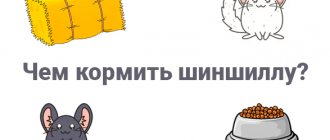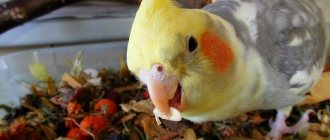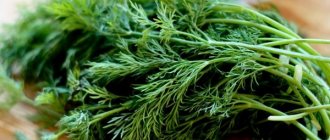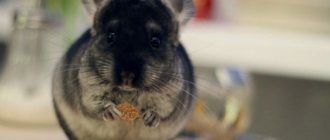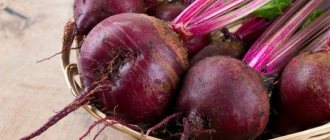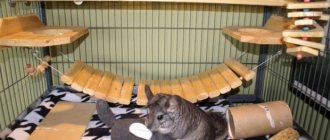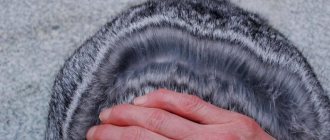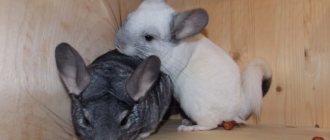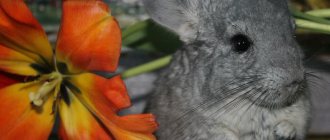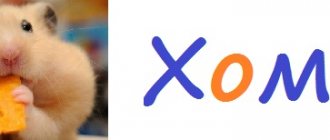What grains can chinchillas eat?
Chinchillas can be given not only grain, but also oatmeal and rolled oats; they are better accepted by the animal. The mucous substances contained in oatmeal and broth are useful for digestive disorders. Oats are commonly used as the base for grain mixtures and can make up up to 75% of the total grain.
Interesting materials:
Why does my cat constantly meow for no reason? Why does a cat meow when you pet it? Why might a cat abandon her kittens? Why doesn't my cat go to the toilet? Why doesn't my cat sleep at night? Why does a cat carry kittens by the scruff of the neck? Why does a cat meow a lot? Why does a cat yell at night? Why does a cat bite off kittens' whiskers? Why does a cat take kittens to another place?
Prohibited Products
Persimmons are prohibited for feeding. This fruit, useful for humans, is rich in iodine, which is contraindicated for animals. In addition to iodine, persimmons contain a lot of sugar and astringents, which will lead to constipation.
It is not recommended to give chinchillas and beets.
The root vegetable is healthy, but has a laxative effect. In rare cases, small pieces of beets can be given for constipation. Any type of cabbage leads to severe gas formation. Chinchillas love to feast on tea rose petals - they taste pleasant and have an attractive aroma. If flowers are grown in your own garden, there is no danger, but it is better not to give store-bought ones. They contain a lot of pesticides and chemicals that can cause serious poisoning.
When preparing tree branches for the winter, it is worth remembering which species are dangerous and unsuitable for feeding. Branches of which trees cannot be harvested:
- Apricot,
- white acacia,
- Beech,
- Ash leaf maple,
- Common buckthorn
- Cedar,
- Chestnut,
- Branches of any citrus species,
- Cypress,
- Elderberries,
- Cherries,
- Cherries,
- Branches of any coniferous species,
- Holly,
- Hydrangeas,
- Juniper,
- Common maple
- Myrta,
- Oleander,
- Plums.
Oak bark and twigs can only be given to animals suffering from diarrhea. In healthy animals they cause severe constipation.
Branches of stone fruit trees (cherry, cherry, plum, and so on) are dangerous because they contain a dangerous cyanide compound, as a result of the breakdown of which hydrocyanic acid is formed in the chinchilla’s body. If you feed an animal with such twigs, you can get not only severe poisoning, but also the rapid death of your pet.
Prohibited products also include any type of honey, as well as store-bought cottage cheese and fermented milk products.
Not all breeders know that chinchillas should not be given leaves, stems and flowers of indoor plants. Most of them are poisonous to the animal and very often cause death.
It is also not recommended to give any food from a person's table. Everything that is normal and familiar, even useful for people, for a chinchilla becomes the cause of digestive problems, allergies, obesity and other serious diseases. The animal will never refuse tasty and aromatic food and can eat a piece of cake, cheese, meat or fish. However, such food is not normal and familiar to the stomach of a furry pet. And the possible consequences are very sad.
What not to give to chinchillas
Chinchillas should not be fed food from their table, as well as various foods not intended for these animals. There is also a list of products prohibited for feeding exotic rodents.
What not to give to chinchillas:
- from grain crops - rye;
- juicy herbs, vegetables and fruits, because chinchillas may have indigestion;
- leaves of lily of the valley, buttercup, milkweed, field mustard, datura, marigold, fern, poisonous buttercup, larkspur and hemlock - these herbs are poisonous;
- branches - coniferous trees, chestnut, maple, cypress, white acacia, elderberry, plum, apricot, cherry;
- from fruits - citrus fruits, persimmons;
- vegetables – potatoes and fresh cabbage;
- pine nuts and almonds;
- apricot kernels;
- offal;
- meat, bones;
- any sweets (including dried fruits), honey;
- hard cheese;
- sausage and smoked meats;
- products of non-natural origin.
Rules for feeding pet chinchillas
The chinchilla is a herbivorous rodent that eats food in small quantities, but quite often.
Basic feeding rules:
- There should always be a supply of healthy food in your pet's feeder.
- New foods are introduced into the diet with caution.
- Balanced and varied menu.
- Chinchillas are very active, so they need high-calorie food, which also keeps the rodent's beautiful fur healthy.
Nutrition and daily routine
Chinchillas are nocturnal. Activity appears closer to 18-20 pm. The owner must ensure that there is enough food in the pet's feeder to eat at night.
It is better to feed the rodent at the same time. He will quickly get used to the regime, which will have a positive effect on the digestion process.
Chinchillas have sharp teeth that grow throughout their lives. In order for the pet to have the opportunity to grind down its teeth if necessary, you need to put tree branches in the cage, with the exception of coniferous species with a high resin content. Preferred are apple, linden, birch and hazel.
In addition to wooden twigs, special toys, mineral and chalk stones are also used.
Composition and balance of the diet
The diet for a pet rodent is selected individually, taking into account the pet’s age, health status, taste preferences and physiological characteristics of the body.
The main composition of the diet for pet chinchillas:
- Rough feed - hay, branches of trees and shrubs.
- Grain mixtures for chinchillas.
- Treats – berries and nuts, dried fruits, vegetables.
The daily food intake for an adult pet is 55-65 g. A balanced diet involves feeding in the following ratio: 25 g of roughage, 25 g of grain mixture, up to 5 g of vegetables and the same amount of additional treats.
How to feed
The first feeding takes place no earlier than 6 pm. The owner can pour grain feed into the feeder. It is not necessary to calculate the portion. Chinchillas are not prone to gluttony and obesity, so they will eat exactly as much as their body needs.
There should always be fresh and clean hay in the cage. The bundle can be placed in a certain corner or in a special hay feeder. Make sure your chinchilla is never left without this tasty and healthy food.
Drinking regime
Clean drinking water should always be freely available to the rodent. It is better to use distilled or filtered water. You should not give chinchillas regular tap water. You can also give chinchillas a decoction of chamomile, rose hips, and currants without adding sugar.
Chinchilla nutrition in the wild
What chinchillas eat in nature largely depends on the time of year and season, but the animals prefer food exclusively of plant origin.
The main diet consists of:
- Various herbs,
- Shoots of bushes,
- Koreshkov,
- Succulents,
- Mkhov,
- Lichens.
The dense, watery leaves of succulents provide a good source of water, and chinchillas also drink dew. In nature, animals absorb large amounts of succulent food, but they do not have problems with digestion. This is explained by the fact that some of the plants that animals eat contain astringents and natural antibiotics. If there is not enough succulent plant food, the animals may begin to eat the bark of trees, as well as various small insects.
What you can and cannot feed your chinchilla
Inexperienced chinchilla breeders often make stupid mistakes when treating their favorite animals with pine nuts, chips or tangerines. As a result, completely hairless animals with severe allergies are brought to veterinarians; sometimes errors in nutrition cause the death of the pet. Chinchillas can be given pelleted food, hay and water. All other products must be strictly dosed. We recommend that you familiarize yourself with the list of products that can or cannot be used to feed your little friend.
Table of permitted and prohibited products
| Product | Possible in small quantities | It is forbidden |
| Grain and cereals | corn | rye |
| soybeans | ||
| rice | ||
| buckwheat | ||
| millet | ||
| oats | ||
| wheat | ||
| barley | ||
| beans | ||
| beans | ||
| peas | ||
| Greens and leaves | dandelion | raven eye |
| horse sorrel | poisonous buttercup | |
| plantain | dope | |
| nettle | white hellebore | |
| clover | lily of the valley | |
| Potentilla anseri | spurge | |
| alfalfa | digitalis | |
| burdock | marigold | |
| parsley | fern | |
| salad | Highlander | |
| spinach | field mustard | |
| raspberry leaves | larkspur | |
| strawberry leaves | marsh marigold | |
| yarrow | lumbago | |
| strawberry leaves | spotted hemlock | |
| chicory | carrot tops | |
| Branches | birch | apricot |
| oak | white acacia | |
| willow | beech | |
| aspen | elder | |
| juniper | cherry | |
| pine | cypress | |
| pear | plum | |
| Apple tree | maple | |
| sea buckthorn | chestnut | |
| Fruits, vegetables and berries | bananas | beet |
| apples | persimmon | |
| pears | fresh cabbage | |
| figs | fresh potatoes | |
| pumpkin | orange | |
| tomatoes | mandarin | |
| squash | ||
| prunes | ||
| dried apricots | ||
| raisin | ||
| strawberries | ||
| blueberry | ||
| strawberry | ||
| rose hip | ||
| Jerusalem artichoke | ||
| carrot | ||
| kohlrabi | ||
| zucchini | ||
| milk corn | ||
| Bell pepper | ||
| zucchini | ||
| Seeds and nuts | linen | apricot kernels |
| Walnut | Pine nuts | |
| almond | ||
| hazelnut | ||
| peanut | ||
| pumpkin | ||
| sunflower | ||
| Dairy products for lactating and pregnant females | kefir | |
| milk | ||
| curdled milk | ||
| milk granules | ||
| cottage cheese | ||
| yogurt | ||
| Animal proteins | meat and bone meal | meat |
| bones | ||
| offal | ||
| Other | tea | cheese |
| rose petals | sweets | |
| honey | ||
| smoked meats | ||
| alcohol | ||
| chips, kirieshki |
A balanced diet for a domestic chinchilla is the key to its long healthy life and ability to reproduce. Take care and feed your furry pets properly.
Can chinchillas have walnuts and chestnuts?
Chinchillas are herbivores and it is natural for them to eat vegetation. Their diet should be high in fiber and protein, but low in fat and moisture.
Approximate feed composition:
- 35% carbohydrates;
- 15% protein;
- 30% fiber;
- 4% sugar;
- no more than 3.5% fat.
In their natural environment, chinchillas eat bark. It is the main supplier of fiber. If it is not enough, their teeth become overgrown and digestion is disrupted. Be sure to also provide your pet with hay and grass.
Did you know? From one hair follicle of a chinchilla, up to 60 hairs grow, while in humans
—only one. Therefore, their fur coats are very thick, which allows them to retain body heat even at high altitudes in the mountains.
As for fat, its excess will lead to liver damage. Therefore, giving nuts is not recommended. The table below shows the fat content of some types:
| Nut\fat content (per 100 g of product): | Seeds or pits\fat content (per 100 g of product): |
|
|
As can be seen from the table, all nuts, without exception, contain many times more fat than a chinchilla can consume. Therefore, such food is more of an exception than a healthy food.
Fresh and dried herb
Like rabbits, chinchillas love grass and hay. Dandelion (dried leaves and roots) is useful for nursing mothers, promotes the production of lactose, and contains a large amount of useful substances and vitamins. Dried chicory root helps digestion, contains inulin, vitamins B, C, anti-inflammatory and anthelmintic. It is very useful to add it to the animal’s food during or after illness. Hibiscus is given to strengthen the immune system. It is a tonic for lethargy and apathy, as well as an excellent vitamin supplement.
Flax seeds are beneficial primarily for their omega-3 fatty acids, without which no animal can have beautiful fur or healthy skin. It also contains protein, fiber, and alpha-linolenic acid. Strengthens fur, makes it silky, develops immunity, thanks to the content of vitamins E and F. Lentils also have a beneficial effect on fur; they are rich in zinc. Buckwheat is an essential supplement for chinchillas, containing 18 beneficial amino acids and substances.
These healthy and tasty supplements should be given in very small doses so as not to spoil the animal or cause unpleasant consequences. Dandelion, chicory, flax - no more than a teaspoon per week; buckwheat – half a spoon per day; hibiscus, lentils - a tablespoon per week.
Sometimes it is good for the teeth and general mood to give chinchillas tasty branches of apple, currant, raspberry, birch, willow, and linden. But resin-containing and hard plants (pine, oak, cherry, plum) are strictly prohibited.
It is advisable to cut fresh grass yourself in the summer in parks, forests, and playgrounds, and only then harvest it. It should be rich in color, juicy, and not have an unpleasant odor. Dry leaves, sun-dried grass and other debris are best thrown away when it comes to feeding in the summer. The herb should be dried in a dark place, stirring periodically (once a week).
Norms and rules of feeding
To organize a balanced diet for your fluffy, you must first familiarize yourself with the established norms and rules for feeding chinchillas. To organize proper nutrition, you must adhere to the following principles:
- Maintain the ratio between fats, proteins and carbohydrates. The approximate daily requirement for a chinchilla is as follows - 5:20:65, respectively.
- Always put enough food in the feeder. An adult chinchilla eats 30-35 g of food per day. But it is better to leave food in reserve in the cage, because the animal may get hungry, for example, after active games.
- Feed your pet once a day - in the evening. The chinchilla is a nocturnal animal. Therefore, there is no need to feed the rodent during the day; it will sleep through the feeding anyway. It is better to offer your fluffy fresh food at the peak of his activity - around 20-22 hours.
- When purchasing food, pay attention to the date of manufacture of the product. It is better to buy a composition that has at least 3 months left before its expiration date.
- Use only high-quality, thoroughly washed products when feeding naturally. Vegetables and fruits must be seasonal, ripe, free from rotten rot and mold. It is better to collect grass and twigs yourself, away from environmental pollutants.
- Be careful when introducing new foods into your pet's diet. Chinchillas have very sensitive digestion, so sudden introduction of new foods can, at best, lead to an upset stomach. At worst, it can lead to illness or even death of the animal. Therefore, for the first time, treats should be given in minimal portions - 1-2 g. In the absence of negative reactions from the gastrointestinal tract, the dosage can be gradually increased each time, bringing it to 5 g.
- Refrain from feeding your chinchilla sugary and high-calorie treats too often. Despite the temptation to pamper your fluffy more often with dried fruits, nuts and fruit sticks, it is better not to do this. Excessive consumption of high-calorie food will lead to obesity in your pet and, as a result, to a decrease in physical activity, loss of strength, apathy, and problems with the cardiovascular system.
Particular attention should be paid to feeding pregnant and lactating females. At these life stages, chinchilla girls need more energy. Therefore, their diet should be as varied as possible, including more fresh fruits and vegetables, and when feeding babies, nuts. It is recommended to increase the total daily dosage of food for chinchillas during pregnancy and after birth by 10%.
If the animal is sick or weakened, on the contrary, you should not forcefully try to feed it. It is better to carefully leave veterinarian-recommended products in the cage and leave your pet alone. When the chinchilla gets hungry, she will come to the feeder on her own.
Contraindications and harm
Among the most common contraindications to the use of seeds, various allergic reactions and inadequate immediate reactions are in first place.
If you suddenly see that after eating seeds, your rabbit has foam at the mouth, it becomes difficult for him to breathe (he coughs, starts sneezing, wheezing, etc.) or massive swelling appears on his body - then know that he seeds are contraindicated.
In general, it is quite difficult to identify general groups of contraindications for all types of seeds. For example, a contraindication to consuming sunflower seeds is animal obesity, while for pumpkin seeds this is, on the contrary, an indication.
Sunflower should also not be eaten by rabbits whose age has passed 5–7 years, who have atherosclerosis or have/had high cholesterol levels.
Pumpkin kernels are not recommended to be given to rabbits that have digestive disorders, have recently suffered acute infectious diseases, or during the period of a full-blown clinical picture of any disease.
Pumpkin seeds should also not be eaten by those furry animals that have problems with the functioning of their senses: hearing, vision and smell, as this can negatively affect them.
Important! If any of the symptoms listed in this section appear, we recommend that you immediately seek help from a professional veterinarian. Among other possible harms from eating seeds, you should also expect the development of: appendicitis, irritable bowel syndrome, diarrhea (roasted sunflower), constipation (pumpkin), vomiting, various changes in the lipid spectrum of the blood, obesity (sunflower), loss of hair and claws, and the appearance of irritation on the skin
Types of feed
A chinchilla can be fed a variety of foods. Some of them are mandatory and form the bulk of the daily diet.
Roughage
Rough feed includes hay and tree branches. These animals' digestive system is designed in such a way that if there is no hay, they can die suddenly. You can purchase the finished product in the store. It is better to give preference to hay, which consists of forbs (timothy, dandelion, clover, vetch, etc.). Hay is also necessary for grinding down the back teeth - prepainters.
Some owners make hay themselves, but in this case you need to be extremely careful. Pathogenic microorganisms, dangerous fungi and mold can multiply in the harvested hay. This product should not be given to a pet rodent. This can cause severe poisoning, even death.
To destroy pathogenic microorganisms that may be present in the hay, it is necessary to use special products from veterinary pharmacies. After treatment with this composition, all hazardous elements are neutralized.
In addition to hay, the diet of a domestic chinchilla should always include branches of bushes and trees. With their help, the pet regularly sharpens its teeth (incisors).
Herbs and plants
Herbs and plants are useful supplements of plant origin that should be given to your pet in limited quantities. The daily norm is up to 5-10 g.
Ready mixes
In the store you can buy ready-made mixtures for feeding pet chinchillas. High-quality food contains all the necessary vitamins and mineral complexes necessary for the healthy growth and development of your pet.
The composition of ready-made mixtures includes different components: grains, cereals, seeds, bran, etc.
Cereals
Grain mixtures form an important part of the daily diet of pet chinchillas. This product contains all the necessary vitamins, minerals, proteins, fats and other beneficial microelements.
It is not advisable to feed your pet one type of grain. Priority is given to feeding a mixture of different grains.
Vegetables and fruits
Juicy foods include fresh vegetables and fruits. These products are a real storehouse of useful vitamins and minerals. They are served to your pet as a treat in small pieces. Fruits and vegetables can only be given to chinchillas in dried form.
After feeding a new product, the owner needs to monitor the condition of the rodent. If symptoms of intestinal upset are observed, it is better to exclude this product from the diet.
A chinchilla should not be fed spoiled, rotten, stale or unripe fruits and vegetables! Such feeding will lead to illness and death of the pet.
Vitamins and treats
The animal should receive the bulk of its vitamins from daily food. During cold weather, additional vitamin supplements should be introduced into the diet. You can buy them in the store.
You can diversify your rodent's menu with various delicacies - berries, nuts, fresh and dried fruits. It is better to alternate such products and be sure to dose them. Each complementary food is given in strictly limited portions. Overeating on treats can cause serious harm to your health.
In case of lack of nutritional mixture in pet products
It may happen that the necessary food is not available at the pet store, in which case there is no need to panic. Now we will describe step by step what can be given instead of food at home.
You should make a mixture of 20% oats, 10% buckwheat, 20% wheat groats, 10% barley grains, 55% maize, 8% flaxseeds, 7% peas or chickpeas, add nettle greens to this mixture. A special complex of vitamins, ground calcium and methonine should be added to the resulting consistency.
As a result, you get healthy and high-calorie food. But there is also a drawback to such a mixture: if in the store the food is granulated, then in the home, each grain is separated from each other and the pet can sort through the food.
Foods that can be given in limited quantities
The list of products that chinchillas are fed at home includes some that can be given to the animals in small quantities.
- Nuts, sunflower seeds, peas, lentils, corn are highly nutritious food, rich in protein and fat. If the rodent is overfed with these foods, it becomes fat and its digestion may be impaired.
- Juicy greens (lettuce, dandelion) and vegetables (cucumbers, zucchini) are loved by animals, but these foods weaken them. Each day, one animal is given half a leaf of lettuce or one slice of cucumber 3–4 mm thick.
- Sweet fruits and berries are a favorite food for chinchillas, but in large quantities they can lead to metabolic failure.
- It is advisable to give branches of plants such as raspberry, willow, oak, alder and birch no more than once a week.
Each product new to the animal is given in the smallest dose, observing the pet’s behavior. If there is no deterioration in health within 24 hours after the introduction of the food, the product can be offered in an increased volume.
Natural treats
The main treat for chinchillas is dried apples. They contain fiber, which promotes proper digestion. Remove toxic waste products and improve overall metabolism in the animal’s body. Like carrots, apples help strengthen fur and the cardiovascular system.
Dried carrots are perfect for constant pampering. It contains vitamins A, B, C, E, a large amount of iron, potassium, calcium. As you know, this is the main supplier of beneficial carotene to the body. Carrots are a natural teeth cleaner. Since it awakens the appetite, you don’t need to give it a lot at once - a pinch a day is enough. Sweet pepper in the same quantity is an excellent vitamin supplement that strengthens teeth, gums and immunity.
Raisins are given to strengthen the heart, as a cure for anemia and weakness. Chinchillas love it very much because raisins contain a lot of sugar. But you should not give more than 1 berry per week. Raspberries can be given fresh or dried, 2-3 berries per week (like hawthorn). It is rich in organic acids and salts of iron, potassium, and copper. Dried hawthorn is more of a medicine than a tasty treat. It helps to calm down, cope with stress, and is also indispensable for intestinal upset. The same amount of pumpkin seeds can be given to improve digestion, skin, and hair follicles.
Chokeberry is also rich in amino acids and rare vitamin P. Together with sweet pepper, they normalize the composition of vitamins and microelements in the chinchilla’s body. In addition to the listed delicacies, you can give nettles, oats, almonds, linden flowers, and fresh (not fried!) sunflower seeds. Chinchillas also love to sip green tea from time to time. It is rich in vitamins B1, B2, K, C, BB, and optimizes the nervous system. Green tea is a powerful antioxidant; it is better not to give more than a teaspoon per week.
